
by Steve | Jul 8, 2020 | July-August 2020, Magazine, Magazine Articles
By Rob Renfroe –
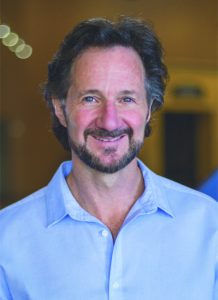 One of the great counterintuitive truths of our faith is that God brings good out of bad. What human beings mean for evil, God often uses to bring about a new and better day. There is no greater example than the cross. Our Lord Jesus – pure, innocent, and compassionate – made to suffer the most painful and shameful death the Roman Empire could devise. And from this terribly heinous act, God brought forth his most gracious gift – salvation for all who will believe.
One of the great counterintuitive truths of our faith is that God brings good out of bad. What human beings mean for evil, God often uses to bring about a new and better day. There is no greater example than the cross. Our Lord Jesus – pure, innocent, and compassionate – made to suffer the most painful and shameful death the Roman Empire could devise. And from this terribly heinous act, God brought forth his most gracious gift – salvation for all who will believe.
Our country is reeling from an atrocious, unjust act – the killing of George Floyd, made worse by the fact that it was perpetrated by one, and watched for nearly nine minutes without objection by others, who were sworn to serve and protect their community. For the God who brings good out of evil, this is certainly an opportunity to do something dramatic and powerful that will change our world for the better. And as the people who serve that God, we have an opportunity and a calling to join him in what he is doing.
I do not know all that needs to be done. I do not know what God will call upon you or me or his church to do. And I certainly do not know the depth of pain my African American brothers and sisters have experienced throughout their lifetimes. But there are some things I do know. And so do you. So do all Bible believing followers of Jesus.
We know every human being is made in the image of God. In fact, this is the first truth God’s word tells us about what it means to be human. “So, God created humankind in his own image; in the image of God he created them” (Genesis 1:27). Every human being possesses immense, inherent worth not because of what he or she achieves, how they live, the social status they enjoy, or the race they belong to. Every human life has infinite value because every person bears the image of God.
We know racism is wrong. If every human being is created in God’s image, racism and prejudice are not simply sins against a person or a community, but against God himself. We know as persons who hold the Scriptures to be true, we must condemn however our society promotes racial stereotypes and we must recognize, confess, and repent of whatever prejudice lives within our souls. We cannot be neutral, look the other way, or be satisfied that our nation has made great strides in the past to overcome racism. It still exists, sometimes in ways that are hard for some of us to perceive. So, we must ask God to give us “eyes to see” and the courage to call it out whether we discern it in our institutions or in ourselves.
We know diversity is a blessing from God. The human race that God created is a beautiful tapestry of races, ethnicities, and cultures. Our appreciation of God’s creation, the wonders of his grace, and his calling upon our lives is made richer and more powerful when we embrace this diversity and learn from the experiences and the perspectives of others who are different than we are. When our pride or our need to justify ourselves or our fear keeps us from receiving the stories and the gifts those who are different from ourselves can bring into our lives, we not only impoverish ourselves, we also deny God’s good creation.
This is true for humankind and even more for the church of God. “For we were all baptized by one Spirit so as to form one body – whether Jew or Gentile, slave or free … The body is not made up of one part but many” (1 Corinthians 12:13-14). We need each other. We need poor and wealthy, male and female, young and old, developed world and developing world, “red and yellow, black, brown, and white.” We need everyone in the church. And as individuals we need relationships with people who have different experiences, perspectives, and stories. Without such relationships, we will never see the world or God’s plan for the world rightly and fully. We know this is true because God’s word tells us it is. And we know we must be intentional about creating relationships that cross the lines that too often divide us.
We know our hearts often deceive us. Jeremiah tells us “the heart is deceitful above all things … who can understand its way” (17:9)? It’s possible, no, it’s likely, that we will be blind to what resides within our hearts. We will convince ourselves that our intentions are more righteous and our motives more pure than they truly are. We will be oblivious to the prejudice that dwells within us – and sometimes because we want to be ignorant about who and what we are. Without knowing it, we will try to protect our image of ourselves as good and decent folks by not being willing to look deeply within our own souls and admitting what we find there. This doesn’t make us bad people; it makes us human beings who possess a fallen nature. But we know it’s there, this tendency to hide the truth about ourselves from ourselves. We know this because God’s word tells us so. Consequently, we also know we must examine ourselves and ask the Holy Spirit to reveal to us whatever prejudice lies within us.
I don’t know what God will do with this terrible moment we find ourselves in. But I know what I can do with it. I can look within myself, admit what I find there, confess it, repent of it, and ask God to change me. And so can you. And that will be a start.
We know we are called to be peacemakers. Not peacekeepers, but peacemakers. Making peace in times of turmoil and misunderstanding can be frustrating and even dangerous. But it’s a ministry that we are called to. “Blessed are the peacemakers, for they will be called children of God” (Matthew 5:9). I do not know all that peacemaking will require, but I know that it begins with listening. For me, it means continuing the conversations I have recently had with black friends and colleagues. Listening to black parents and grandparents tell me how worried they are about the safety of their children and grandchildren every time they leave the house. Hearing the fear beneath the words of African American men who have told me they are regularly pulled over by the police for no other reason than they are in “the wrong part of town” – their town, their hometown. Talking with black pastors, as educated, gifted, and committed as I am, who grieve that because of their race they will never be given opportunities to serve many of our great churches that are predominantly white. And hearing the painful truth that many of these pastors are concerned that the same will be true even after we create a new Methodist denomination.
Peacemaking begins with listening, but it doesn’t end there. For true peace to be made, there must be equal opportunity for all people. There must be justice for the victimized. There must be accountability for those who perpetrate violence. There must be an admission on the part of white folks that many of us have chosen to remain ignorant regarding race in our country and the suffering persons of color have endured. We must admit this, confess it, and repent of it and of all the ways we have been complicit. There must be outrage on our part in the face of injustice and racism. And there must be real change in our hearts, in our country, and in our churches
We know we are fighting more than flesh and blood. Paul tells us that our struggle to advance God’s Kingdom and its values is against “the rulers, the authorities, the powers of this dark world and against the spiritual forces of evil in the heavenly realm” (Ephesians 6:12). Paul understood that there was more to the ignorance and the evil we encounter than what dwells in the human heart. There are spiritual forces at work, organizing the systems and the structures of our world in ways that are counter to the will of God and his good design for creation.
We cannot be naïve. If we believe in the Bible as God’s word, we must expect to find sin within the institutions of our fallen society. We cannot minimize the work of “the evil one,” “the prince of this world,” to only individual temptations. His plan is more encompassing and his powers of deceit far greater. His desire is to infiltrate and warp all that influences humankind. Our entertainment. Our government. The media. Education. The Church. We must have “kingdom eyes” to look at society’s institutions. And we must be willing to call out unrighteousness and injustice wherever we see them, and we must work to reclaim these institutions for the glory of God and the good of all humankind.
I do not know how God will use this moment. But I know he will be at work for good. I know that you and I and all who name the name of Jesus must ask for eyes to see and a determination to act in accordance with God’s will. I do not know everything I need to know for this moment. But I know enough to begin to make things better. And so do you.

by Steve | Jul 8, 2020 | July-August 2020, Magazine, Magazine Articles
By Heather Hahn-
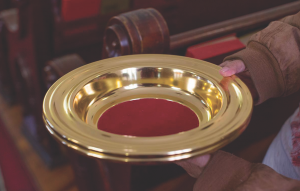
An empty collection plate. Photo illustration by Kathleen Barry, UMNS.
The United Methodist Church already is feeling financial fallout from COVID-19’s devastating spread. In a May 29 online meeting that also included prayers for an end to racism, General Council on Finance and Administration board members got a glimpse of some of the financial challenges ahead.
For the first four months of the year, general church apportionment receipts in the U.S. dropped about $3.2 million compared to the same period in 2019. April, so far, saw the steepest decline — with the collection rate down 26 percent compared to last year and 45 percent compared to 2017.
“This indicates the impact that the coronavirus has had so far on general church collections,” Rick King, GCFA’s chief financial officer, told the board.
By April, United Methodist churches around the globe had suspended in-person worship to slow the deadly coronavirus. Congregations are just now slowly returning to their buildings but with a whole checklist of added and potentially expensive precautions.
Funding for the denomination’s seven general church funds comes from conferences, which in turn ask for apportionments – requested giving – from local churches. Typically, more than 85 cents of every dollar in local church revenue remains with that congregation. About 2 cents of each dollar given goes to general church ministries.
General church apportionments support bishops, ministerial education, most general agencies, general administration, and denomination-wide efforts such as the Black College Fund, ecumenical work, and Africa University in Zimbabwe. The U.S. church provides 99 percent of the funding for general church ministries.
For now, many U.S. conferences have allowed churches to hold off on apportionments to bolster their ministries, and at least three of the 54 U.S. conferences have laid off or furloughed staff. An untold number of United Methodist churchgoers also are now out of work, as the U.S. sees its highest unemployment rate since the Great Depression in the 1930s.
Already faced with uncertainty, the denomination’s Episcopal Fund that supports bishops and most United Methodist general agencies had budgeted for 2020 based on a 70 percent apportionment collection rate. At the current giving rate, the General Council on Finance and Administration projects 2020 apportionments could come well below that.
The GCFA board spent part of its meeting hearing an update on the Episcopal Fund, which was in peril of running out of money even before the current crisis. At present, King said, the fund’s revenue is about $422,000 lower than budgeted, but because of reduced spending, the bishops are making up for some of that lost revenue. Still, at a 65 percent annual giving rate, GCFA projects that the fund could be in the red by the end of 2022.
In May, the bishops agreed to form a task force that will look at strategies to move the Episcopal Fund toward financial sustainability. Among the ideas on the table is reducing the number of U.S. bishops. The task force plans to release its recommendations in November.
Over the past three years, the GCFA board each summer has set bishops’ salaries and support for their office staff. However, the board is postponing any action until it receives the task force’s report, said the Rev. Steve Wood, who chairs the board’s committee on general agency and episcopal matters.
Amid the drops in giving, various U.S. United Methodist entities, including churches, conferences, and general agencies, have found some relief from Paycheck Protection Program loans. The U.S. Small Business Administration program, initiated in response to the coronavirus, aims to help small businesses – including nonprofits – keep workers on the payroll.
Most of the 10 general agencies that receive church giving, including GCFA, have applied for and received loans through the program. The one exception is the United Methodist Board of Higher Education and Ministry. All told, the agencies now have nearly $7.9 million in loans. Based on the program’s requirements, the agencies each expect their loan amounts to be forgiven.
“Some agencies have returned funds they deemed to be in excess of the amount that will be forgiven,” King told United Methodist News.
Heather Hahn is a multimedia news reporter for United Methodist News.

by Steve | Jul 8, 2020 | July-August 2020, Magazine, Magazine Articles
By Steve Beard –
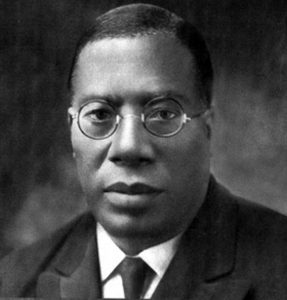
Charles Albert Tindley was one of Methodism’s premier pulpiteers and song writers. Image: Charles L. Blockson Afro-American Collection, Temple University Libraries, Philadelphia.
Charles Albert Tindley arrived for his first pastoral appointment in Cape May, New Jersey, in the middle of a snow storm. With small children to feed, Charles and his wife had only a stale piece of bread. As parents, they dipped the bread in water to soften it for the kids.
Charles asked his wife to set the table as if there was food for breakfast. Swallowing her reluctance, she agreed to do as he asked. As the story has been relayed by his youngest son, the parents got on their knees to thank God for their lives, their health, for the snow storm, and the rising sun in the morning.
“Not once did he complain about the shortage of provisions, but thanked God for what they had,” E.T. Tindley writes. They got up from their knees and sat at the barren table. When they did, there was a loud commotion outside. They heard a man commanding a team of horses.
“Whoa! Whoa!” They then heard loud stomps on the front porch. “Hey! Is anybody alive here?”
Tindley opened the front door and was face to face with a man with a large sack on his shoulder. Dropping it to the floor with a thud, the stranger said: “Knowing you were the new parson here, and not knowing how you were making out in this storm, my wife and I thought you might need some food. I’ve a cartload of wood out here, too. I’ll dump it and be on my way.”
Tears streamed down Tindley’s face. “You are an answer to prayer, for we didn’t have anything to eat except a stale crust of bread … We are not going to worry though, for we know God will provide a way.”
Later that night, Tindley was seated in a rocker thinking over the blessings of the day. In the afterglow of the miracle, he wrote the song, “God Will Provide For Me.”
Here I may be weak and poor,
With afflictions to endure;
All about me not a ray of light to see,
Just as He has often done,
For His helpless trusting ones,
God has promised to provide for me.
Charles Albert Tindley went on to become one of Methodism’s greatest pulpiteers and a pillar of faith. His life was bookended by the Civil War and the Great Depression. Tindley’s father was a slave, but his mother was a free woman of color. Tragically, he lost both his parents at very young age and had to live with strangers who did not permit him to read or go to church.
Seemingly every step of the way, Tindley (1851-1933) faced adversity and challenges. Nevertheless, he showed steadfast determination, ingenuity, and faith. From his Methodist pulpit, he became known as the “Prince of Preachers,” composed dozens of popular gospel songs, launched one of the first soup kitchens in his city, and spurred economic development for African Americans in Philadelphia through a savings and loan that helped secure home ownership. The church he shepherded – now called Tindley Temple – is still a historic and vibrant fixture in its community.
Tindley was filled with intellectual curiosity and passion. As a child he began to learn to read by picking up scraps of newspapers along the roadside. He studied the shape of each letter and attempted to use bits of coal to teach himself to write.
After the Civil War, Tindley and his wife moved to Philadelphia and attended Bainbridge Street Methodist Episcopal Church. He eventually became the janitor at the church. Although he had never been to college, he began studying for the Methodist ministry in order to pass the denominational examination with a high enough score. He learned Greek through a correspondence course offered by Boston Theological School and studied Hebrew with a rabbi at a synagogue in Philadelphia.
At the time of the exam, an arrogant college graduate snidely asked Tindley, “How do you expect to pass this examination? I and the other candidates hold diplomas in our hands. What do you hold?”
“Nothing but a broom,” replied Tindley who had just been sweeping around the church. Tindley passed second among a large class of candidates, all of whom had academic degrees.
When the storms of life are raging, stand by me;
When the storms of life are raging, stand by me;
When the world is tossing me, like a ship upon the sea,
Thou who rulest wind and water, stand by me.
After several different pastoral assignments, Tindley was eventually appointed to the very church he had previously swept as a janitor. As a young boy, he once wallowed in shame because he had no shoes to wear to church and had to sneak up into the balcony and hide behind boxes to attend a worship service. Now, because of a lifetime of walking barefooted in faith, he became the pastor of one of the largest congregations in Methodism and was routinely preaching and breaking into song at “standing room only” Sunday services.
Tindley is rightfully considered the “Grandfather of Gospel Music,” serving as an inspiration to Thomas Dorsey, usually indentified as one of the pivotal founding fathers of gospel music. Tindley’s songs are still found in the United Methodist Hymnal, as well as those of other denominations. His songs were recorded by gospel legends such as Mahalia Jackson (“Beams of Heaven”), the Soul Stirrers (“By and By”), the Ward Singers (“Take Your Burden to the Lord”), Blind Joe Taggart (“The Storm is Passing Over”), Sister Rosetta Tharpe (“What Are They Doing in Heaven”), and Elvis Presley (“Stand By Me”).
So pervasive was his influence that one of his hymns was the inspiration behind the Civil Rights anthem, “We Shall Overcome.”
Tindley had witnessed some of the worst chapters of the unfolding American experiment. He preached faith, protested against injustice, provided food and shelter, and sang from his soul. His artistry dealt honestly with suffering and hardships. At the same time, he lived and saw through the eye and heart of faith. He knew that one day – someday – things would be redeemed and transformed. In “Beams of Heaven,” his vision shines through:
I do not know how long ‘twill be,
Nor what the future holds for me.
But this I know; if Jesus leads me,
I shall get home someday.
Steve Beard is the editor of Good News.

by Steve | Jul 8, 2020 | July-August 2020, Magazine, Magazine Articles
By Leonard E. Fairley
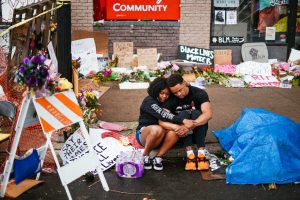
Mourners at the corner of 38th and Chicago in Minneapolis – the location of George Floyd’s death. Photo by David Parks.
“What Started Out As A Peaceful Protest Turned Violent,” “Seven Shot in Louisville Demonstration Against Breonna Taylor’s Death,” “Chaotic Minneapolis Protests Spread Amid Emotional Calls For Justice, Peace,” “Protest Turns Violent!”
These are the headlines we’ve been waking up to lately. Like many of you, I read these headlines with a broken, devastated, and troubled heart, a heart that was already breaking due to the death of three people of color who should be alive – Ahmaud Arbery, Breonna Taylor, and George Floyd.
As an African American male, I felt these deaths on an intimate level because I know firsthand what the evil of racism feels and looks like. My heart wept at the sight of an effigy hanging right here in Kentucky: As an African American male, I felt the historic pain of countless brown- and black-skinned people hanging from lynching trees. My heart wept when an African American bird watcher suffered the threat of harm by having the police called on him. This list could go on and on.
We must not dishonor the memories of these souls by practicing the spirit of an eye for eye and a tooth for tooth. We must not dishonor their memories by causing more blood to run though our streets or the destruction of property to occur. These deaths deserve better.
My heart also weeps when protesting for right becomes the face of the very evil, injustice, and oppression it tries to eliminate and call attention to. It has, and will in the days ahead, become incumbent on all of us to nonviolently work toward driving from our communities, nation, and world the hatred, violence, and injustice, caused by racism or any other “ism” that fosters prejudice and oppression.
In our heart of hearts, we know none of these evils are from God. We as Christian disciples of Jesus Christ shouldn’t accept them as normal. We must together fight them with hearts and actions of peace, not war.
I acknowledge that much of the protesting comes from pent-up frustration and disappointment. We have a right to be disappointed when a life is taken needlessly and unjustly. It is never easy to suffer injustice and not become bitter when you feel your only recourse is protest. “It is always right to protest for right,” Martin Luther King said.
However, protesting for right doesn’t mean we replace one violent act for another. Violence is a vicious cycle that leaves only victims. Again, we cannot allow our protesting for right to simply become another face of the wrong or injustice we’re protesting. We cannot live by trading one form of bitterness and violence for another. Hatred, vitriolic words, chants, or slogans are never the answer. Hatred, violence, and injustice are cycles that feed on each other. King also said, “Hate cannot drive out hate; only love can do that.”
“I am weary from my moaning; every night I flood my bed with tears; I drench my couch with weeping.” – Psalm 31:9-10. Like the psalmist, we grow weary of all the violence, all the hatred, and all the polarization and division.
I think people have grown immune to voices that can write eloquent statements that come with a title and office such as a Bishop. One would expect me to respond. Yet how can I live into my role as Bishop and shepherd and remain silent? What we long for and must hear are the actions and voices of passionate, spiritual disciples who have a desire to do right – a desire to do God’s will as we pray, “deliver us from evil.” We long for voices of people who have never spoken out against anything and would never dare join a protest or write a political statement or get lost in social media battles.
Brothers and sisters in Christ, what is happening in our world, our communities, and our nation goes far beyond politics or labels. Christian people of goodwill must find their voices or we will continue to fall deeper into this darkness. Somehow our voices of hope, peace, love, and kindness must rise from the ashes and help swing this pendulum toward what the Lord requires of all of us who dare call ourselves followers of Jesus Christ. “He has told you, O mortal, what is good; and what does the Lord require of you but to do justice, and to love kindness, and to walk humbly with your God” (Micah 6:8).
Somehow the spirit of Jesus that lives in you must rise up in all humility and proclaim in his name: Enough is enough. “Come, Lord Jesus, come” and show us how to live with each other, reminding us that there is a more excellent way.
I have little left but grief and heartache. Yet, with every ounce of my one hope, I pray we will learn that all cops are not bad, all black men are not thugs, and racism is a disease that must be admitted before it can be cured.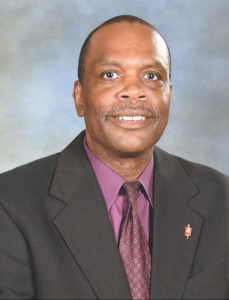
I appeal to the Christian conscience of every passionate, spiritual disciple and sisters and brothers in Christ to join my spirit and say, “Not like this!” Stop the police killings. Stop the racism. Stop the divisive and vitriolic language. Stop the injustice. Stop the destructive protest. Protest we must, but not like this.
Let us rise up and tell the world, the nation, every perpetrator spreading injustice, every perpetrator spreading hatred, death, and violence, that this is not the way. There is still a more excellent way to rise up and tell this divided world and nation that his name is Jesus, bringer of peace and healer with the power of reconciliation and redemptive sacrificial agape (love), as the only true light in darkness.
Help us to remember in these dark days, as King said, “At the center of non-violence stands the principle of love.”
“Be gracious to [us], O Lord, for [we are] in distress; [our] eyes waste away with grief, [our] soul and body also” (Psalm 31:9).
Leonard E. Fairley is the episcopal leader of the Kentucky Annual Conference of The United Methodist Church. This statement was issued by Bishop Fairley on May 30, 2020, and is reprinted here by permission.

by Steve | Jul 8, 2020 | July-August 2020, Magazine, Magazine Articles
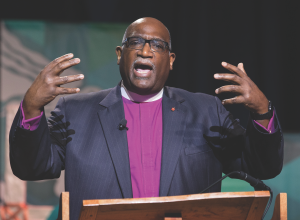
Bishop Gregory V. Palmer of the West Ohio Annual Conference delivers the episcopal address during the 2016 United Methodist General Conference in Portland, Oregon. Photo by Mike DuBose, UMNS.
“What a season we have been through and what a week we are in,” wrote Bishop Gregory V. Palmer to the United Methodists in the West Ohio Annual Conference. “The angst and pain are palpable. I need you to know I share that pain and I see me in some way, shape, or form every time I see video clips from Minneapolis and around the country. I have no illusion. It could have been me. That’s the world in which we live.
“The death of George Floyd is a painful sequel to much that we have seen before,” Palmer continued. “God help us if you please. I grieve for the Floyd family and all the families that have had the same or similar experience. God heal their hearts. I shudder as I watch the burning in Minneapolis, but I do watch and choose not to look away. Looking away perpetuates avoidance. I look not to condone but to be drawn deeper into the compassionate heart of Jesus our savior. Lord give us eyes to see.”
Within our society and around the world, the horrific deaths of George Floyd, Breonna Taylor, and Ahmaud Arbery have sparked passionate protest, intense soul-searching, and purposeful prayer. At this time, Christians are looking for ways to be a faithful witness to the Gospel of our Lord Jesus and his kingdom of compassion, righteousness, and justice.
“It is time to use our voices, our pens, our feet, and our heart for change,” the United Methodist Council of Bishops expressed in a statement, signed by Bishop Cynthia Fierro Harvey, president of the council. The bishops encouraged United Methodists to spend eight minutes and 46 seconds in prayer at 8:46 a.m. and 8:46 p.m. each day for a 30 day period. The time allocations are in remembrance of George Floyd who was killed on May 25 when a police officer kneeled on his neck for eight minutes and 46 seconds in Minneapolis.
“Pray for all persons of color who suffer at the hands of injustice and oppression. Pray for our church as we take a stand against racism,” the statement reads. “Imagine the power of a concert of prayer heard around the world.”
During this tumultuous time of both social distancing and social upheaval, we are called to act, pray, and love our neighbors. During this time, several bishops have reflected on the issues confronting our society and the call to justice.
• Bishop Sharma Lewis, Virginia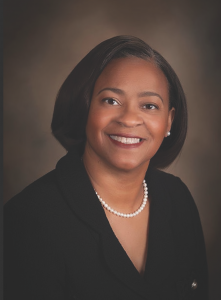
“When do we as children of God decide that God is calling us into action? When do we decide that mere words or social media interactions for a few days are just not enough?
“When do we as children of God decide that the systemic racism in our society, whether manifested overtly or covertly, is a sin that hinders our relationship with Jesus Christ and is antithetical to the gospel?”
• Bishop Bruce R. Ough, Dakotas-Minnesota
“Now, it is our responsibility as persons of faith, and particularly as followers of Jesus in the Methodist tradition, to address this pervasive pandemic of racism. We are compelled to address this pandemic with the same intensity and intentionality with which we are addressing COVID-19.
“We begin by acknowledging that racism is sin and antithetical to the gospel. We confess and denounce our own complicity. We take a stand against any and all expressions of racism and white supremacy, beginning with the racial, cultural, and class disparities in our state and country that are highlighted by the coronavirus pandemic.”
• Bishop Jonathan Holston, South Carolina
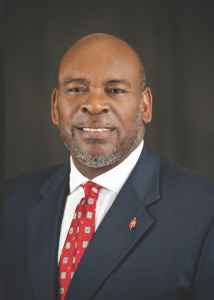 “As United Methodists and followers of Christ, we commit ourselves to social justice and to opposing racism in all of its forms. We encourage frank and thoughtful conversation and respectful collaboration with a common goal of justice for all. It is our obligation to be a beacon of love when hatred threatens to blot out the light of hope.”
“As United Methodists and followers of Christ, we commit ourselves to social justice and to opposing racism in all of its forms. We encourage frank and thoughtful conversation and respectful collaboration with a common goal of justice for all. It is our obligation to be a beacon of love when hatred threatens to blot out the light of hope.”
Bishop Holston wrote in a later statement, “When we witness inexplicable injustice, anger is understandable, protest is appropriate, and action is vital. Violence and destruction, though, is never the answer.
“We are encouraged to see people flood the streets to peacefully call for justice and an end to oppression. This is faith in action – the bedrock of our commitment to social justice as United Methodists and followers of Christ.”
• Bishop Frank Beard, Illinois Great Rivers
“It is the job of every Christian to serve as conduits of grace, mercy, and love so that the dark forces of our world might experience the liberating light of Jesus Christ. It is our job to help stamp out hatred in any form. Therefore, I encourage all United Methodists to pray for the families that are affected by this most recent tragedy, as well as those suffering a similar plight in recent months. I remind us all that it is our duty, as sisters and brothers, to stand-up, speak-out, and advocate for those that are hurting and marginalized, so that justice may become a reality.”
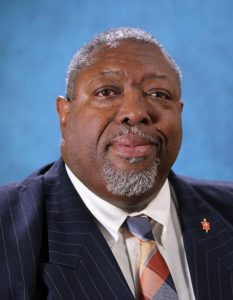
In a separate statement, Bishop Beard offered practical suggestions as we wrestle with the issues of race, prejudice, and injustice.
“Dealing with racism is not easy and it takes a lot of energy and forethought that will often move us into uncomfortable places. Speaking up and out is important, even though people often are scared to say anything because they worry that if they say the wrong thing, they might get in trouble or find themselves being labeled. It is crucial for Christians to create safe sanctuaries where we can have difficult conversations about racism and other topics that promote injustice.”
Beard offered 10 ways that Christians can begin to “address systemic injustice and discrimination.”
1. Becoming aware of policies and practices that promote disparities based on race, ethnicity, stereotypes, or economic status.
2. By employing the use of empathetic listening that is engaging and helps with validating the feelings and personal experiences of persons of color, without being dismissive or making explanatory comments that seek to rationalize or soothe away their pain.
3. Learn to recognize and understand your own privilege and experiences that are based on skin color and power.
4. Share your own story as you engage in tough conversations about race and injustice. Your story will help foster deeper understanding for you and for others as you interact together.
5. Recognize that America is NOT a “melting pot” but rather a “garden salad” containing a blend of unique colors and flavors meant to be experienced together. DO Not give in to the myth that you must be “color blind.”
6. Seek to identify with those that are marginalized and who face the effects of a system that thrives and survives on racist behavior and practices.
7. Use the power of your own personal finances by taking a stand with your money. Be aware of the practices of those you do business with.
8. Create safe places for difficult conversations, utilizing people experienced in providing diversity training.
9. Develop and foster relationships with people of color based on mutual respect and concern for each other’s well-being.
10. As people of faith, pray for and with others, that Jesus’ prayer for unity would become a reality.

by Steve | Jul 8, 2020 | July-August 2020, Magazine, Magazine Articles
By Keith Boyette –
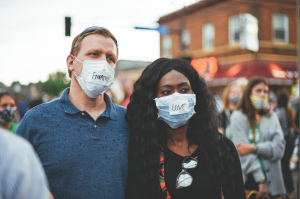
Mourners and protesters gather at the corner of 38th and Chicago in Minneapolis – the place of George Floyd’s death – to reflect, grieve, and hear the message during a service sponsored by the Worldwide Outreach for Christ – a church in that neighborhood for 38 years. The congregation hosted open-air evangelistic and prayer services for those in the community. Photo by David Parks.
At its founding in its Statement of Moral Principles, the Wesleyan Covenant Association declared, “We believe that all persons are of sacred worth…. The WCA specifically renounces all racial and ethnic discrimination and commits itself to work toward full racial and ethnic equality in the church and in society.” Recent events in the United States underscore how absolutely critical this work is.
We are outraged by the murders of Ahmaud Arbery, Breonna Taylor, and George Floyd. The horrific taking of each of their lives cries out for justice. Yet what they experienced were not isolated incidents. Racism, systemic injustice, and the use of force leading to the killing of African Americans is an affront to God’s good gift of life and human dignity. It has no place in the body of Christ or in any society that aspires to reflect the character of Jesus. It is sin.
As Christians we are called to relentlessly work for a society where African Americans no longer have to fear for their lives or be treated differently when encountered by law enforcement, or when they are simply going about the business of their daily lives. We must dedicate ourselves to building a church that bears witness to the dignity of all God’s people, particularly those who have been marginalized, stereotyped, and treated with cruelty and violence based on the color of their skin. The church must summon every fiber of its being to root out racism in its midst. Collectively and individually, we must examine our hearts, our minds, our institutions, and our practices, and, with unwavering determination, stamp out racism.
The battle against the evil of racism requires far more than an occasional statement or symbolic ceremony. Rooting out the conscious and unconscious ways in which we diminish others requires perseverance and disciplined focus. We must continually call ourselves to account. We must empower others to speak truth into each of our lives. There is no room for rationalization or justification. The work requires persistent, sacrificial discipline proactively engaging our own prejudices, biases, and actions, and engaging the ways in which those prejudices and biases have found expression in the systems of which we are a part. The work calls us to intervene and speak up when we are witnesses to racism and systemic injustice. We must overturn systemic injustices.
At its foundation, Scripture calls us to acknowledge that every person we encounter is made in the image of God – nothing diminishes or obviates that reality. Therefore we Christians must accord all people their human dignity, defend their God-given rights, and see that justice is done for them just as we expect it to be done for ourselves.
In recent days, I read again the words of the Rev. Dr. Martin Luther King, Jr. in his “I Have A Dream” speech delivered on August 28, 1963, at the Lincoln Memorial in Washington, D.C. He declared, “Now is the time to make real the promises of democracy. Now is the time to rise from the dark and desolate valley… to the sunlit path of racial justice. Now is the time to lift our nation from the quicksands of racial injustice to the solid rock of brotherhood. Now is the time to make justice a reality for all of God’s children.”
Sadly, we have failed to “make justice a reality for all God’s children.” We must acknowledge our failure and redouble our commitment to work toward full racial and ethnic equality in the church and in society. Let us not relent or rest until we have achieved that reality.
Keith Boyette is president of the Wesleyan Covenant Association and an elder in the Virginia Conference of The United Methodist Church.

 One of the great counterintuitive truths of our faith is that God brings good out of bad. What human beings mean for evil, God often uses to bring about a new and better day. There is no greater example than the cross. Our Lord Jesus – pure, innocent, and compassionate – made to suffer the most painful and shameful death the Roman Empire could devise. And from this terribly heinous act, God brought forth his most gracious gift – salvation for all who will believe.
One of the great counterintuitive truths of our faith is that God brings good out of bad. What human beings mean for evil, God often uses to bring about a new and better day. There is no greater example than the cross. Our Lord Jesus – pure, innocent, and compassionate – made to suffer the most painful and shameful death the Roman Empire could devise. And from this terribly heinous act, God brought forth his most gracious gift – salvation for all who will believe.






 “As United Methodists and followers of Christ, we commit ourselves to social justice and to opposing racism in all of its forms. We encourage frank and thoughtful conversation and respectful collaboration with a common goal of justice for all. It is our obligation to be a beacon of love when hatred threatens to blot out the light of hope.”
“As United Methodists and followers of Christ, we commit ourselves to social justice and to opposing racism in all of its forms. We encourage frank and thoughtful conversation and respectful collaboration with a common goal of justice for all. It is our obligation to be a beacon of love when hatred threatens to blot out the light of hope.”
